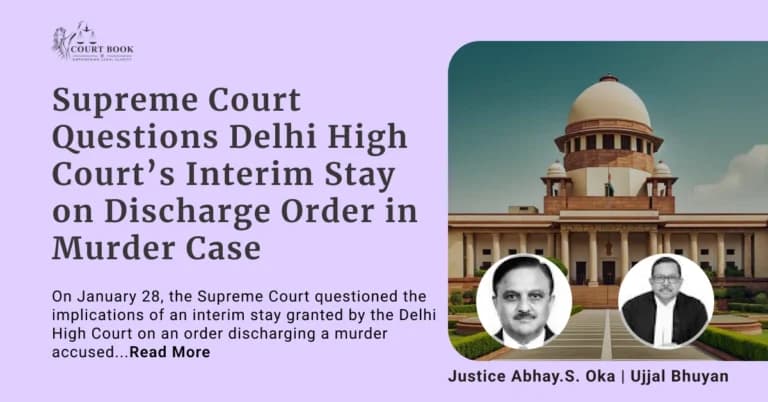On January 28, the Supreme Court questioned the implications of an interim stay granted by the Delhi High Court on an order discharging a murder accused. The Court observed that such a stay effectively forces the accused to face trial without legally setting aside the discharge order.
A bench comprising Justice Abhay S. Oka and Justice Ujjal Bhuyan was hearing a petition filed by Sikh leader Sudershan Singh Wazir. The petition challenged the Delhi High Court's order, which had stayed his discharge in a murder case and directed him to surrender.
Justice Abhay S. Oka raised critical concerns over the legal validity of the stay on discharge orders. He pointed out that by granting such an order, the trial court was effectively proceeding with the case even though the discharge had not been set aside.
“How can there be an interim stay on discharge? Tomorrow, courts will grant an interim stay on acquittal too. If someone stays an acquittal order, does that mean the person should be taken into custody again?”
Read Also:- Supreme Court Acquits Man Sentenced to Death for Rape and Murder Due to ‘Gaping Holes’ in Prosecution
The victim’s son’s counsel argued that Wazir was allowed to apply for bail. However, Justice Oka expressed skepticism about this process, stating:
“A person is discharged. Despite the fact that the discharge order is not set aside, he is taken into custody. Then he must first apply to the sessions court, which may deny bail. If that happens, he will approach the High Court, and if that fails, he has to come to the Supreme Court. Is this how our legal system works?”
Justice Oka further emphasized that the legal system must ensure justice for all, recalling how even Ajmal Kasab, the 26/11 Mumbai attack convict, was given a fair trial.
Concerns Over Delay in Legal Proceedings
The Supreme Court also questioned the delay in resolving such cases and the
“If a person is detained due to an interim stay, but later the discharge order is upheld, will the State compensate him for wrongful detention? High Court revisions can take years to resolve.”
Justice Oka reiterated that interim relief should support the final relief, stating that an ex-parte stay on discharge contradicts legal principles. He further suggested that at most, the High Court could have directed the accused to furnish bail while the revision application was pending.
Read Also:- Groom Penalized for Dowry Demand: Supreme Court Upholds Conviction and Orders ₹3 Lakh Compensation
Calling the High Court's Order "Absurd"
Calling the High Court's decision "drastic and absurd," Justice Oka remarked:
“A person is discharged, then the revision court stays the discharge, and the accused has to face trial. How is this logical?”
Additional Solicitor General (ASG) Rajkumar Bhaskar Thakare defended the High Court’s decision, stating that it had exercised its powers under Sections 397 and 401 of the CrPC, finding a prima facie case against the discharge order.
However, Justice Oka insisted on seeing specific recorded reasons justifying the stay:
“Where is the finding that the discharge order was prima facie wrong? The High Court’s reasoning is only one sentence long, stating that the prosecution’s argument appears to have substance.”
The ASG urged the Court to balance societal interests and victims' rights, requesting two weeks to file a counter affidavit. However, Justice Oka criticized the practice of filing counter affidavits in every case challenging High Court orders, calling it unnecessary unless new material was introduced.
The victim's counsel defended the High Court's order, stating that it merely questioned the discharge order's validity and that Wazir could apply for bail. However, Justice Oka countered, emphasizing the practical difficulties in obtaining bail.
The Supreme Court has scheduled the matter for further arguments on February 4, 2025, allowing time for the prosecution to present its case.
Read Also:- Delhi HC Rejects Petition to Cancel AAP’s Registration Over Criminal Records (ECI Directed)
Case Background
- Accused: Sudershan Singh Wazir, former President of the Jammu and Kashmir State Gurdwara Parbandhak Board
- Charge: Accused in the 2021 murder of former National Conference MLC Trilochan Singh Wazir
- Trial Court Ruling: Discharged Wazir and three co-accused on October 26, 2023, but retained charges against another accused
- High Court Ruling: Stayed the discharge order, directed Wazir to surrender, and ruled that his release became invalid
- Supreme Court Involvement: Issued notice on November 11, 2024, challenging the High Court's stay order
The Supreme Court has raised serious concerns over the Delhi High Court’s decision to grant an interim stay on the discharge of an accused. Justice Oka’s observations highlight fundamental issues related to judicial procedure, the rights of the accused, and the fairness of the criminal justice system.
The Court’s remarks suggest that interim orders should not undermine the principles of justice, and it remains to be seen how the prosecution and defense will argue their cases in the upcoming hearing.
Case Number: SLP(Crl) No. 015749 - 015750 / 2024
Case Title: Sudershan Singh Wazir v. State (NCT of Delhi) and Ors.















